Simplifying Financial Confusion
LEARN CASH FLOW HACKING TO REACH FINANCIAL FREEDOM
Used by 90% of millionaires to reach their financial goals 4x faster
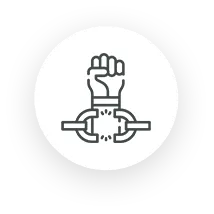
Achieve Financial Freedom Through Cash Flow Hacking
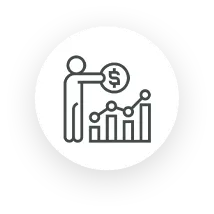
Increase Your Lifestyle While You Build Your Wealth
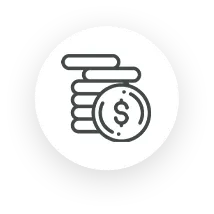
Position Yourself to Thrive in Market Downturn
YOU SHOULD NOT FEEL OUT OF CONTROL ABOUT YOUR FINANCIAL STRATEGY

Have easy access to your money in case of emergencies and opportunities

Use the investment strategy 90% of millionaires use

You deserve a clear plan to consistently grow your money and avoid market uncertainty

Have a guide and advisor that has your best interest in mind

Do not overpay in taxes

Stop guessing at the best vehicles to protect and grow your money
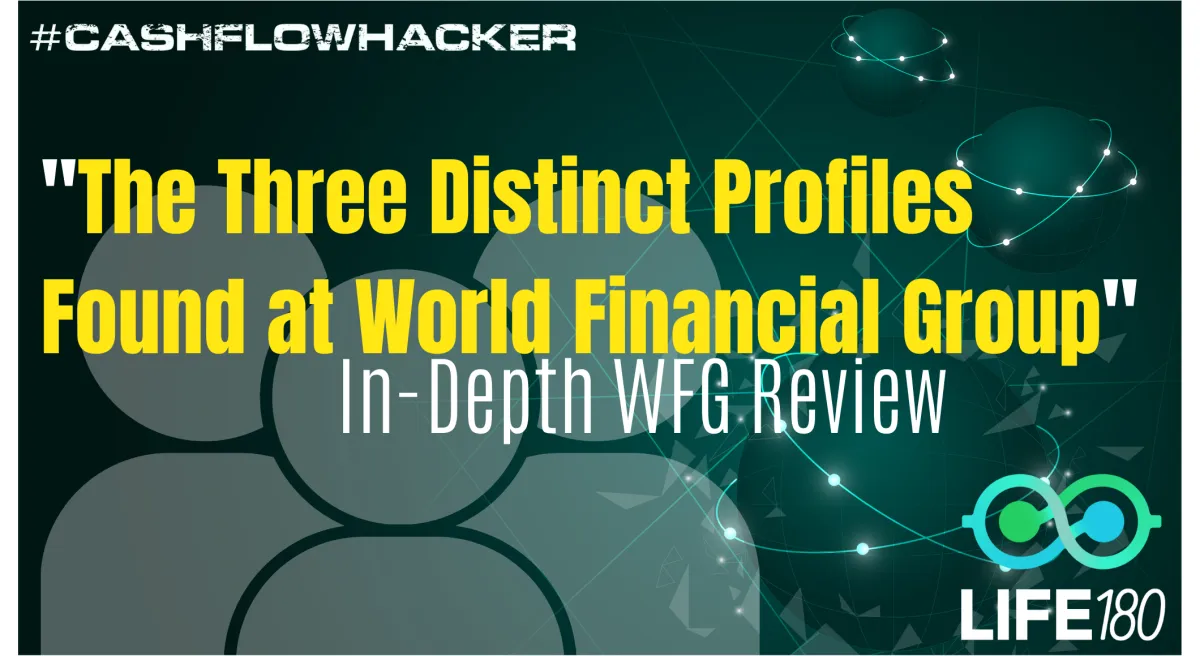
The Three Types of People of World Financial Group | WFG Review
Discover the video content related to this article on our YouTube channel, Life180. Delve into additional insights and lively discussions by exploring our channel for valuable content and updates.
Intro to World Financial Group Review
The World Financial Group stands out as arguably the largest independent marketing organization in the life insurance business nationally. Achieving such a position isn't a matter of chance; it reflects the success of various strategic initiatives undertaken by WFG. The organization excels in numerous aspects, contributing to its prominent status in the industry.
If you follow my channel, you're likely aware that I've conducted several critical reviews of the World Financial Group (WFG) in the past, assessing their compensation plan, interviewing agents, and encountering various challenges. It's crucial to note that these reviews were conducted several years ago when I wasn't licensed, didn't have my own opportunity, and wasn't involved in any agency. I want to be completely transparent about this, acknowledging that there may be skepticism regarding my past assessments.
I anticipate that some may claim I'm using this as a platform to recruit or to criticize and downplay WFG. However, I want to emphasize that this is not my intention. I have no interest in undermining the company. Instead, I want to share a recent experience. I was invited to an event hosted by one of the largest WFG teams in the country last week, and it proved to be a fascinating experience. Despite my preconceived notions about WFG, its events, and its people, I was surprised to find that some of my beliefs were inaccurate. On the other hand, some of my assumptions were confirmed, while others were exacerbated, further solidifying my convictions and beliefs. I want to provide an honest account of this experience, shedding light on both the unexpected and reaffirmed aspects.
In this article, my primary aim is to share my personal experience and, more importantly, to highlight the most significant realization I had during the recent event I attended. I'll delve into my overall impressions, emphasizing that what I present is solely based on my opinions and observations.
It's crucial to acknowledge that there are diverse perspectives and motivations for people joining this business. However, I want to express my viewpoint on what, in my belief, should be the foremost reason for engaging in this industry helping others. From my perspective, the essence of this business lies in assisting individuals with their financial matters, aiding them in protecting their families, and ultimately, making a positive impact in their lives.
To fulfill this role effectively, one must possess a profound understanding of the products and demonstrate expertise in the field. This expertise is fundamental for approaching the business with conviction and confidence, ensuring that you are genuinely capable of serving and assisting those you aim to help.
The Reason WFG Is So Successful At Recruiting
In my recent experience, I shared my initial reactions in a live session, the link to which you can find here. In that live session, I provided my immediate thoughts on some aspects I noticed during the first day of the event. One particular segment involved a training session conducted by Doug Andrew for the agents in the group. I must admit that the training was challenging for me to sit through, as it seemed filled with half-truths and misleading information.
What became clear to me is that the size of WFG is attributed to their ability to simplify a message, even if it may not be entirely accurate or factual. They leverage emotion and simplicity, casting a broad net to reach the masses. In essence, they appeal to a wide range of individuals. I encountered people at the event who were financially strained, scraping together just enough money to cover the $200 event fee. These individuals were genuinely desperate, seeking ways to build a business for supplementary income and harboring hopes for a more secure future.
It's fascinating how diverse the demographic was within the group of around 700 people I encountered at the event. From someone struggling to afford the $200 event fee to a successful individual making a million dollars in his business, the range of backgrounds and financial situations was extensive. I believe that everyone deserves an opportunity for personal growth and expansion, and I don't see an issue with that diversity.
The event provided valuable information on various topics such as taxes, government issues, and financial planning. They even had the former comptroller of the U.S. government discussing critical issues like the national deficit, government debt, and the likelihood of increasing taxes. The discussions on estates, trust planning, and tax strategies were particularly insightful.
However, what I observed is that the event cleverly intertwined this valuable information with an appeal to people's fears and concerns. There was a recurring theme of mistrust in the government and skepticism towards traditional financial methodologies. I resonate with the idea of being cautious about government involvement in personal matters and finances, a sentiment that seemed to be shared by many attendees. The event positioned itself as an alternative to conventional approaches, suggesting that the government and the financial system might not have individuals' best interests at heart.
The proposed solution in this scenario revolves around indexed universal life insurance, and this is where my concerns arise. My issue stems from the combination of the heavy reliance on indexed universal life insurance and its apparent misrepresentation. Particularly, the concern lies in the fact that they are targeting the middle to upper-middle class, encompassing the middle, lower-middle class to the middle, middle-upper class. This demographic seems to be their sweet spot, and it's clear that this comprises the majority of the country's population.
Examining this, it's evident that they are specifically targeting a demographic set that, unfortunately, is most vulnerable when it comes to indexed universal life. This demographic, ranging from the middle to upper-middle class, is characterized by individuals who can afford the least amount of risk. If indexed universal life were to fail for them, and as I've outlined in my content, a failure that I believe is likely, it could have significant repercussions.
I've substantiated my views on this matter, and for those unfamiliar, I've compiled a playlist on indexed universal life training, the link to which I'll include here. I strongly encourage everyone, especially those associated with or considering joining WFG, to watch this content. Understanding the intricacies of the product is, in my opinion, crucial for informed decision-making.
Doug Andrew provides an educational perspective on the history and mechanics of indexed universal life, highlighting its positive aspects such as how it works and the indexing process. However, my concern lies in the omission of crucial components that reveal the inherent risks associated with the policy. He portrays the product as having no downsides, attributing any potential drawbacks solely to improper design, a perspective I find to be far from the truth.
In essence, what I've observed is a significant gap between the portrayed benefits and the actual risks of indexed universal life. I'll keep this article concise, but I've created additional videos and content on my channel, LIFE180, that delve into indexed universal life, the compensation plan, and various elements of WFG. For those seeking a more in-depth understanding, these resources are available for exploration.
The First Type of Person Who Attends A WFG Event (Looking for hope)
What I've observed is that attendees at WFG events often fall into three categories. The first group comprises individuals seeking hope. Many attend these events with the goal of finding additional sources of income, and you seem to be part of this demographic.
One notable observation is that WFG's primary focus, even when selling insurance policies, is on recruiting individuals. It's evident that their primary objective is not solely to serve clients but to consistently promote the opportunity for individuals to join and build their own business. Selling the potential for personal business growth appears to be a key strategy in WFG's approach to expanding its operations.
I appreciate the value you see in individuals building their businesses, recruiting, and establishing downlines or agencies. Entrepreneurship has significant merit, and it's commendable that you believe everyone should have the opportunity to build their business. However, your concern about the misrepresentation and misleading information from WFG is valid.
It's troubling that WFG suggests they are the primary avenue for individuals to build a business, implying that their compensation plan is the exclusive or superior option. Your critique of their compensation plan, being labeled as the worst in the industry to start with, and the suggestion that initial earnings may be minimal with the promise of greater returns through team-building on the back end raises ethical concerns.
While there may be truth to the potential for substantial overrides in the future, the upfront challenges and the portrayal of other compensation plans as less viable warrant careful consideration. Individuals entering the business should be provided with accurate and transparent information to make informed decisions about their involvement.
The imbalance in the system, being light on the front end and heavy on the back end, raises concerns about its fairness. The front-end challenges, as you rightly point out, make it a tougher journey, leading to high turnover – a phenomenon commonly referred to as "burn and churn." The statistics you cite, indicating that 93% of life insurance agents fail in the first three years, are indeed alarming. It's a troubling scenario, and your assumption that World Financial Group's statistics might be at least as bad as the industry standards, if not worse, underscores the severity of the issue.
This high failure rate becomes especially disconcerting when dealing with products like indexed universal life, where the agent's ongoing presence is crucial, as emphasized by Doug Andrew's discussions on the importance of annual portfolio rebalancing. While rebalancing is a valuable practice, it alone cannot address the broader challenges within even a properly designed Indexed Universal Life (IUL) product.
This situation raises questions about the sustainability of the business model and the impact on clients when agents face challenges or leave the business. It emphasizes the need for a more equitable and supportive system, particularly in the crucial early years when agents need substantial assistance.
If you're not present and you've failed in the business, those individuals are left entirely without support, guidance, and are essentially in a challenging situation. They won't receive assistance from the individuals who initially sold them the products because it often evolves into a "set it and forget it" mentality. The focus shifts towards recruiting the next person, building the next team, and moving forward. This is the prevalent approach within the system.
Now, returning to the main point, I've identified three types of individuals in this scenario. The first type is someone who, unfortunately, may not achieve success. These individuals often have high aspirations or grand goals. It's possible they were sold a dream, fostering a bit of hope that they can make the life insurance venture work.
When they bring you into the fold, even before you obtain your license, they prompt you to study for your test, build your contact list, and share your contacts with the upline. Whether you pass the test or not, your upline, the person who recruited and is training you, brings you in, works your leads, and, regardless of your success, may take your contacts to sell them. They might then move on from your involvement, even if you fail, without much concern. This is why I refer to it as an "internal consumption model." Regardless of success or failure, they bring you in to gain access to your contacts, constituting the way they source their leads. I find issues with this approach.
I don't take issue with the expectation that you sell to your friends and family. Selling life insurance should stem from a genuine belief in the product, and it's reasonable to want to help those closest to you first. That, in itself, is important. However, the problem arises when you're pushed to engage in this before acquiring enough knowledge to genuinely believe in the product. That's the issue. You get sold and hyped about its power, but without a full understanding. Regardless of who you are, it's impossible to truly, wholeheartedly believe in something until you comprehend it.
This is the problem I've come to understand and discover: nobody in that room, including several individuals with multiple years of experience and leadership roles, comprehended indexed universal life. This realization occurred after Doug Andrews spoke, and they challenged me based on his statements. When I sat down with them and demonstrated how indexed universal life actually works, going through illustrations and examining their own, I pointed out flaws in the designs they believed were proper. I also highlighted the risks to their clients. The reaction was a room full of stunned faces, realizing the implications and saying, "Oh my gosh, I can't believe this."
The key aspect to understand here is that for the first person, who may not likely succeed anyway, the culture within this environment doesn't seem to mind. The primary focus appears to be on acquiring your list of contacts because, for every person recruited, if they can generate 50 leads and convert five sales, it's considered a win.
This method is viewed as more advantageous than paying for leads online, presenting an easier form of prospecting compared to constant self-prospecting. Once you've exhausted your friends and family, success in this environment demands proficiency in marketing, selling, and providing value to the broader market. Without these skills, failure becomes a probable outcome.
The Second Type of Person Who Attends A WFG Event (curious and investigative)
The second type of person is the one who learns, becomes enthusiastic, and embraces the concept. Incidentally, I fell into this category at a previous career with a life insurance company. As I advanced from being an agent to the director of business development, I developed a genuine fondness for Indexed Universal Life (IUL) for a period. However, as I delved deeper and began asking more questions, the cycle of uncertainty emerged. The more questions I raised, the more uncertain I became, leading to an ongoing loop of doubt. Eventually, I reached a point where I realized I no longer believed in what I was doing.
I confronted a realization that the product wasn't what I initially believed it to be. This led me to question why I hadn't been taught the intricacies, the truth, and the actual workings of the product from the beginning. Why was I only presented with the positives while the negatives were conveniently omitted? This process of discovery and disillusionment can take varied durations, whether three months, three years, or even a decade for individuals to truly understand the nuances of the business.
My director of agent development at Life 180, who previously worked with a company similar to WFG, sold Indexed Universal Life (IUL) and achieved significant milestones like the $100,000 ring. However, it took him eight and a half years to realize that IUL wasn't what he initially thought.
In my case, this realization unfolded over four and a half years, while for others, it might take only months. I refrain from judging any agent who sells IUL because I've been in that position. It would be hypocritical, given that I sold it for four and a half years without fully understanding its complexities. However, as I started asking more critical questions, I encountered pushback, making it abundantly clear that within the WFG culture, asking critical questions can result in being blackballed.
The response to critical questions about how Indexed Universal Life (IUL) works often follows a pattern. They may claim not to understand it or dismiss it by saying they sell a different product, implying a lack of knowledge. Alternatively, they might suggest that those asking questions are bad-mouthing the product and advise adherence to the system, emphasizing that success leaves clues.
The prevailing message is to learn the system and the sales process if one wants to make money. This approach raises moral concerns as it prioritizes financial gain over a genuine understanding of the products being sold, which is essential for serving clients responsibly. While there is rhetoric about helping people, the emphasis in the business seems to lean heavily towards making money, lacking substantial education on technically helping clients. This focus on financial success over genuine service is a significant concern in the industry, where the primary emphasis should be on serving people rather than individual financial gains.
The structure of the compensation plan introduces moral hazards, particularly when the metrics and benchmarks are centered around achieving ranks like the 1110 club, 117 club, or 3330 club, which entails specific policy and recruitment targets within a designated timeframe.
The inherent problem lies in the fact that the incentives in the compensation plan prioritize making more money and earning commissions. The emphasis is placed on hitting ranks, and even for those expressing a desire to design policies correctly, the pressure to meet these rank targets often takes precedence. The result is a situation where poorly designed World Financial Group policies are prevalent because the incentives revolve around commissions and credits, with overrides being granted based on these metrics. This setup creates a challenge where individuals may be pressured to hit ranks at the expense of ensuring proper policy design.
The second person in this scenario is inclined to ask more critical questions as they gain experience. They may observe discrepancies between the presented information and their actual experiences in writing policies, attending meetings, and navigating the sales process. However, the culture discourages independent thinking and questioning. There's a strict adherence to the script and sales pitch, with a message that implies individual intelligence is inferior to the established system.
The emphasis is on following the system without injecting personal thoughts or questions. The directive is clear: success leaves clues, follow the system unquestioningly, and adhere to prescribed procedures for financial gain. This approach limits critical thinking and individual understanding, potentially hindering a deeper comprehension of the products and processes involved.
The Success of the Insurance Company is Unrelated to the Effectiveness of Your Policy
They actively discourage attempts to genuinely learn about the products. The narrative is that product education should come from the companies themselves. However, as someone in a position of authority at a prominent IUL company, I can attest that these companies fall short in providing comprehensive training that covers both the positive and negative aspects of their policies.
The primary focus is on highlighting the positive aspects to boost sales, as companies are fundamentally driven by the objective of selling. It's essential to recognize that as indexed universal life companies, they are not mutually held companies, and policyholders are essentially viewed as profit centers, devoid of any moral considerations associated with traditional mutual insurance companies.
Now, I'm not suggesting that these companies harbor any ill intentions or actively seek to harm their policyholders, as intentional harm is not their agenda. However, in reality, when you invest with an Indexed Universal Life (IUL) company, their primary allegiance is either to their shareholders or to participating mutual policyholders who share in the company's profitability.
During challenging times, various adjustments can be made within IUL policies to fulfill the company's obligations. While there is often praise for life insurance companies being among the most stable entities globally, this stability doesn't necessarily safeguard you as a policyholder, especially in the context of an IUL. It's crucial to recognize that despite any personal losses, the IUL company will likely continue its operations, selling policies, leaving you questioning the unforeseen turn of events.
And so that's the challenge there. As you start asking critical questions, the response is redirection. They'll tell you to just follow the system, emphasizing that success leaves clues. If your questions persist, there's a risk of being blackballed, kicked out, or even ostracized, leading to a withdrawal of support and making you the proverbial black sheep.
This dynamic comes with immense pressure, a reality I observed keenly this week. It was difficult to witness because many individuals genuinely wanted to do the right thing. Despite the existing criticisms of WFG, including my own, and skepticism towards the company, its compensation plan, and the products it promotes, the pressure within the organization is palpable and challenging.
And at times, honestly, I've been critical of the people. Yet, from that perspective, it's important to acknowledge that most individuals in WFG have big hearts. They enter into this venture with a genuine desire to do the right thing. Unfortunately, they've been handed a distorted set of beliefs and are getting a raw deal without understanding the intricacies of what they don't know. This lack of awareness remains a significant challenge within the organization.
So what happens is those people wind up either leaving WFG to go somewhere else or they just leave altogether, which is a tragedy to me. Because if they genuinely want to help people, they need to know there are other solutions out there. Honestly, that's one of the reasons I started my Life180 agency in the first place. When I created my first two WFG and PHP videos, it was for analysis, and I had nothing to gain from it. Many people may not believe that, but it was solely driven by my passion for this industry. I coach life insurance agents, assist them with marketing, and when I examined the WFG model, I felt compelled to provide an honest review.
People thought there was something in it for me. I had no agency, no licensing, nothing at that time. However, after numerous people reached out to me for help and advice over six or seven months, I realized there was a need for a solution. That's when we created the agency, and it's been amazing to see the growth and success. It's a phenomenal journey, and I'm proud of the positive impact we've had on individuals seeking guidance in the insurance industry.
The Third Type of Person In World Financial Group (Monetary Motivation)
Now, the third type of person is the one who resonates with making money. They are so money-motivated that they become blinded by the cash. I'm not saying all these people are bad, by the way, because this is just human nature. Sometimes it happens when you look at it. Some people just get blinded by it. They don't see the fact that they're potentially damaging people. They put blind faith because there's a level of desperation, a level of need that comes with making money.
When you have that need to make money, you blindly trust or put more faith in the people leading you. They showcase individuals crossing the stage, talking about their love for their wives, their devotion to God, creating a narrative about how good they are as people. I'm not saying they're bad people; please don't take it that way. What I am saying is they employ a lot of pre-framing and utilize neuro-linguistic programming to create a certain perception.
They present all this information, and what happens is when people encounter negative aspects about Indexed Universal Life, they revert to thinking, "Well, he wouldn't do that," or "She wouldn't do that because they're a Christian, they love their spouse, have kids, a family, and they talk to me." It involves placing a moral judgment on the situation, assuming that these individuals wouldn't act negatively toward others.
Well, either A, there's a chance they don't know what they're doing because they got caught up and became the third person, just chasing the money and trusting the people above them, getting caught up in that cycle. So that's how it works at World Financial Group. In their system, you're one of three people. You either come in without much chance, likely to get flushed out of the system, but they'll capitalize on your leads and relationships to make some policy sales. Even if you don't pass your test, they'll still do that.
You could be the second person, asking critical questions and becoming a thorn in their side, resulting in ostracization or blackballing. In this scenario, you might leave the industry and find another opportunity. On the other hand, you might fall into the third category, putting blind faith in your upline, trusting without doing due diligence or seeking third-party resources for study. Unfortunately, this path may lead to unwittingly causing harm to people by selling a product without a comprehensive understanding.
Really consider if you are wrong with IUL
You bear the responsibility of comprehending what you're selling, especially when dealing with the well-being of your loved ones. While starting with your close circle is crucial, it's imperative to have a deep understanding that instills genuine belief. Any doubt, uncertainty, or lack of comprehension about how the policy functions should be a red flag.
Regardless of the promises of potential gains and downside protection, if you don't fully grasp how the options budget is constructed, the impact of options costs, and the workings of options markets – expertise that comes with being an options market expert – selling IUL may not be suitable for you. Simply put, IUL is essentially a regular universal life product with an attached options strategy.
The complexity of index strategies and the appeal of different indices notwithstanding, the fundamental truth remains: the performance of the index, a focal point of discussions, is among the least crucial factors determining the long-term performance of the policy. This nuance often eludes many, highlighting the intricacies involved in the dynamics of these policies.
This is why I started the LIFE180 Insurance Agency
Since the inception of my agency, I have refrained from any direct calls to action or soliciting individuals to join us. This was never a goal or focus of ours. Presently, I believe we have developed an agency that offers top-tier training, encompassing leadership, product knowledge, and education. I adhere to the principle of proceeding cautiously to achieve sustainable growth. It is my conviction that recruitment should only be pursued when adequate support structures are in place to assist those who join the business.
It is true that our approach may not result in the rapid growth experienced by WFG, and we may not achieve the vast numbers they have. Some might argue that this is fueled by jealousy, but my motivation is quite the opposite. I am intentionally choosing a slower growth trajectory because I am committed to avoiding the pitfalls that organizations like WFG face. Rather than boasting a 7% success rate, I aspire to establish an environment with a 50% or even a 60% success rate. Even a 28% success rate would be a substantial improvement, marking a 400% enhancement. I acknowledge that not everyone will find success in this industry, but I am determined to create a more supportive and successful environment for those who do.
I genuinely believe that those who invest effort, passion, and dedication in this industry have the potential to achieve success. However, in alignment with a broader life philosophy, it's essential not to strain relationships prematurely by blindly relying on those above you. While blind faith might work in areas like network marketing for products such as face cream or health supplements, it becomes a risky and, in my view, an imprudent approach when dealing with people's finances. Entrusting someone else with control over your most meaningful relationships is, in my opinion, an utterly absurd and unwarranted decision.
Absolutely, understanding the intricacies of what you're offering, especially when it comes to financial products, is crucial before embarking on this journey. It's not about discrediting the approach of selling to friends and family; it's about recognizing the responsibility that comes with it. Guarding those cherished relationships means ensuring you are well-informed and equipped to provide the best possible solutions rather than blindly navigating through financial matters. Taking the time to comprehend the products and their implications is a fundamental part of fulfilling that responsibility.
And for anyone who wants to reach out, I'll include a link. You can visit the site to set up an interview with one of my team members. Specifically, you can arrange an interview with my colleague who has been in a WFG-type system for eight and a half years, achieving milestones like the $100,000 ring and more. I believe that having a conversation with him will provide valuable insights and possibly change your perspective on various aspects.
If you have any questions, feel free to leave a comment in the section below. I anticipate receiving a mix of love and criticism, and I'll do my best to respond to each comment. Until next time, wishing you a blessed and inspirational day!
HOW TO START TAKING CONTROL OF YOUR FINANCES BY MAXIMIZING YOUR CASH FLOW AND PROTECTING YOUR ASSETS

1. Schedule Your Free Clarity Call

2. Create a Free Customized Plan

3. Get Guide to Financial Success
GET YOUR FREE COPY TO STOP USING OUTDATED RETIREMENT STRATEGIES
Cash Flow Hacking teaches you to:
Protect Your Investments
Thrive in bad markets
Reach financial freedom faster

ARE YOU LOOKING FOR:
Cash Flow Hacking teaches you to:
Security to protect your money
Increased cash flow and lifestyle
Inflation protection
Financial certainty in all economic environments
A reduction in taxes
Safe and fast access to your money with no penalties
WHO IS THIS PROGRAM FOR?

People looking for an alternative
Are you looking for alternatives to Wall Street’s “buy and hold” strategy that takes 40 years with uncertain results? Our Cash Flow Hacking strategies provide you the building blocks to get started on the right foot

Passionate Entrepreneurs
Are you looking for a financial strategy that will take your best assets (you and your businesses) and multiply their potential? Our Cash Flow hacking strategies will teach you how to invest for the future without sacrificing building your business

Real Estate
Investors
Are you a real estate investor who is burned out from being a landlord or playing the fix-and-flip game? Our Cash Flow Hacking strategies will provide you with the system to create predictable wealth AND give you the freedom you are looking for.
YOU DESERVE PEACE OF MIND AND A PLAN THAT WILL PROTECT YOUR FAMILY AND GROW YOUR WEALTH
Today you need to be more savvy than ever if you try to go at it alone.
Losing money to inflation, taxes, and just poor investment strategies is leaving you frustrated, feeling out of control and not knowing where to turn. To add to the problem, the market is flooded with advisors who have outdated advice that does not place your best interests first, but instead focuses on charging you a fee that creates guaranteed cash flow for them.
NOT YOU
We believe this is wrong and that your security and best interests should be placed first. We believe you should be in a position where you control your money, your money doesn't control you. We understand because we talk with hardworking people everyday that are losing money in the markets based on old information and feel like they are guessing at the best course of action.
We created the Cash Flow Hacking plan to help you have security and control of your money to take advantage of life's opportunities because you deserve peace of mind with your wealth. The old way of planning for retirement of… Go to school Get a job & save as much as you can in your 401k and mutual funds...is broken.
You have been lied to. Think about it, where else in life does someone tell you that the most certain way to achieve your desired result is to take on more risk? The math just doesn't work, and the results are showing in our country and world. Did you know that 90% of millionaires in the United States have 1 asset in common?
Hint: it's not stocks or mutual funds (and no...it's not crypto) How much sense does it make for you to work hard, save money, reduce your current lifestyle (because that's what you are doing when you save for the future - taking money you could use on lifestyle today and delaying gratification to a future unknown time), and hope that whatever you are doing will work three to four decades from now? If you're thinking, "not much sense at all…", you are in the right place.
With over 50 years of experience on our team, we have worked with thousands of individuals and families to achieve financial freedom faster and with more predictability by helping them invest for Cash Flow.
How does the Cash Flow Hacking Plan work? 1. Take the Cash Flow Hacking Challenge 2. Complete the LIFE180 X-Ray and determine what your Freedom Number is 3. Work with a Cash Flow Hacking expert to provide you a customized plan
The customized Cash Flow Hacking plan will give you clarity on where you are now, where you want to go (and in what time frame), and what you need to do to get there predictably.
We value and commit to you: We believe you deserve the best financial education and guidance We believe financial decisions should not be rushed but be well thought out with a plan We believe you should be in control of your money We believe we earn your trust through time, education, and proper due diligence Without a proper plan and guidance, your money can be lost to taxes, inflation, and bad investments You deserve more with the most up-to-date strategies to mitigate your risk, control your money, and earn stable returns regardless of the market Schedule a call here to attain your LIFE180 Financial X-Ray now or get started with the Cash Flow Hacking Challenge for free.
I am interested in...